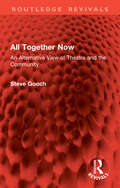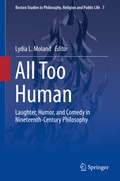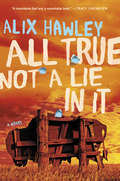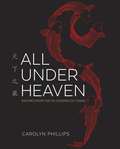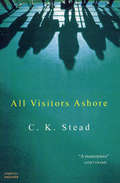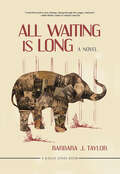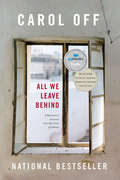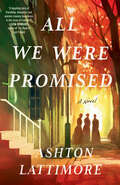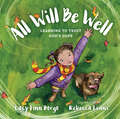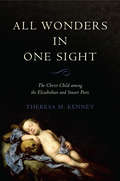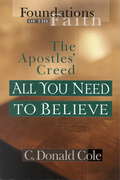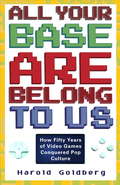- Table View
- List View
All Together Now: An Alternative View of Theatre and the Community (Routledge Revivals)
by Steve GoochIn All Together Now (first published in 1984), Steve Gooch, himself a playwright with extensive experience of ‘community theatre’, looks at the relationship of the theatre to the community in which it takes place. Taking the work of contemporary ‘community theatre’ as a stimulus, he gives a ‘behind-the-scenes’ analysis of the failure of commercial theatre—in the subsidised sector as well as the West End—to transcend the mechanisms of box-office and tradition, and to play a vital and integral part in the life of its audience. Examining the initiatives of small theatres and touring companies in the seventies, Gooch looks critically at their work practices and forms of organisation and draws some positive pointers for the future.As much about the internal workings of theatre production as about the content and outward face of its shows, All Together Now offers new insights into a culture divided between ‘high and low’, ‘popular and serious’.
All Together in One Place (Kinship and Courage #1)
by Jane KirkpatrickOne of the incidents that made a profound impression upon the minds of all: the meeting of eleven wagons returning and not a man left in the entire train; all had died, and been buried on the way, and the women returning alone. --from the journals of Ezra Meeker, 1852. THEIR LIVES WOULD BE TEMPERED BY ADVERSITY, EXPANDED BY FAITH, POLISHED BY PERSEVERANCE--For Madison "Mazy" Bacon, a young wife living in southern Wisconsin, the future appears every bit as promising as it is reassuringly predictable. A loving marriage, a well-organized home, the pleasure of planting an early spring garden--these are the carefully-tended dreams that sustain her heart and nourish her soul.But when her husband of two years sells the homestead and informs her that they are heading west, Mazy's life is ripped down the middle like a poorly mended sheet forgotten in a midwestern storm. Her love is tried, her boundaries stretched, and the fabric of her faith tested. At the same time, she and eleven extraordinary women are pulled toward an uncertain destiny--one that binds them together through reluctance and longing and into acceptance and renewal. Based on an actual 1852 Oregon Trail incident, All Together in One Place, Book One in the Kinship and Courage series, speaks to the strength in every woman and celebrates the promise of hope that unfailingly blooms amidst tragedy and challenge.
All Too Human: Laughter, Humor, and Comedy in Nineteenth-Century Philosophy (Boston Studies in Philosophy, Religion and Public Life #7)
by Lydia L. MolandThis book offers an analysis of humor, comedy, and laughter as philosophical topics in the 19th Century. It traces the introduction of humor as a new aesthetic category inspired by Laurence Sterne’s "Tristram Shandy" and shows Sterne’s deep influence on German aesthetic theorists of this period. Through differentiating humor from comedy, the book suggests important distinctions within the aesthetic philosophies of G.W.F. Hegel, Karl Solger, and Jean Paul Richter. The book links Kant’s underdeveloped incongruity theory of laughter to Schopenhauer’s more complete account and identifies humor’s place in the pessimistic philosophy of Julius Bahnsen. It considers how caricature functioned at the intersection of politics, aesthetics, and ethics in Karl Rosenkranz’s work, and how Kierkegaard and Nietzsche made humor central not only to their philosophical content but also to its style. The book concludes with an explication of French philosopher Henri Bergson’s claim that laughter is a response to mechanical inelasticity.
All True Not a Lie in It: A Novel
by Alix HawleyThe story of pioneer Daniel Boone's life, told in his voice--a tall tale like no other, startling, funny, poignant, romantic and brawling--set during the American Revolutionary WarHere is Daniel Boone as you've never seen him: debut novelist Alix Hawley presents Boone's life, from his childhood in a Quaker colony, through two stints captured by Indians as he attempted to settle Kentucky, the death of a son at the hands of the same Indians and the rescue of a daughter. The prose rivals Hilary Mantel's and Peter Carey's, conveying that sense of being inside the head of a storied historical figure about which much nonsense is spoken while also feeling completely contemporary.Boone was a fabulous hunter and explorer, and a "white Indian," perhaps happiest when he found a place as the captive, adopted son of a chief who was trying to prevent the white settlement of Kentucky. Hawley takes us intimately into the life-and-death survival of people pushing away from security and into Indian lands, despite sense and treaties, just before and into the War of Independence. The love story between Boone and his wife, Rebecca, is rich and tangled, but mostly it's Boone who fascinates, pushing into places where he imagines he can create a new "clean" world, only to find death and trouble and complication. He is a fabulous character, unrivaled in North American literature, and a prime candidate for the tall tale. The storytelling is taut and expert, the descriptions rich and powerful, the prose full of feeling, but Boone is what drives this outstanding debut.
All Under Heaven: Recipes from the 35 Cuisines of China
by Carolyn PhillipsA comprehensive, contemporary portrait of China's culinary landscape and the geography and history that has shaped it, with more than 300 recipes.Vaulting from ancient taverns near the Yangtze River to banquet halls in modern Taipei,All Under Heaven is the first cookbook in English to examine all 35 cuisines of China. Drawing on centuries' worth of culinary texts, as well as her own years working, eating, and cooking in Taiwan, Carolyn Phillips has written a spirited, symphonic love letter to the flavors and textures of Chinese cuisine. With hundreds of recipes--from simple Fried Green Onion Noodles to Lotus-Wrapped Spicy Rice Crumb Pork--written with clear, step-by-step instructions, All Under Heaven serves as both a handbook for the novice and a source of inspiration for the veteran chef.
All Visitors Ashore
by C. K. SteadAs their freinds leave for Europe and the government gets tough with the unions, a bohemian community is enjoying the euphoria of youth.It was their dreamtime. The wider world beckoned from the white ships sailing past Rangitoto Island, but the dream was also here on the Takapuna shoreline of Auckland, where the artist Melior Farbro grew his vegetables and let Cecilia Skyways follow her own form of Zen Buddhism in his garden hut. Where Curl Skidmore, his brilliant young head full of novels waiting to be unravelled, could dream of God, Fame, Nirvana, Great Love, or maybe just sex. Where not even the harbourfront strike of 1951 could convince them that life wasn't about poetry and painting and potential.
All Waiting Is Long: A Novel
by Barbara J. Taylor"Powerful...Every page is saturated with the 1930s milieu as the sisters navigate the adversities of their reality on a sea rough with the unrealistic expectations of well-intended idealists both religious and secular. As if to highlight those expectations, Taylor periodically interrupts her third-person narrative with Greek chorus-type commentary from the Scranton-based Isabelle Lumley Bible Class, including excerpts from a 1929 sex manual for women. The overall result is a thought-provoking book club discussion cornucopia."--Booklist, Starred review"Set in the 1930s, Taylor's suspenseful and intricate follow-up to Sing in the Morning, Cry at Night tells the story of sisters Violet and Lily Morgan...Taylor delivers startling plot twists and incisive commentary on the social unrest of a coal-mining town during the Great Depression. Covering a six-year span, the novel reveals the consequences of arduous labor and widespread sterilizations that came with the eugenics movement. Among the prostitutes, mobsters, and miners is a web of interconnected lives that come together for a breathtaking ending in Taylor's fine sequel."--Publishers Weekly"A good selection for book clubs, All Waiting Is Long is set in Pennsylvania coal country in the 1930s, a time of tumultuous change and social unrest, including the rise of the eugenics movement. Barbara Taylor's characters--a cast of nuns and prostitutes, mobsters and miners, social activists and church busybodies--reflect the varying pressures and expectations of small-town life with rich, insightful prose and dialogue that rings true to each character's voice. Will the web of lies the two sisters weave around themselves survive? You''ll have to read it yourself to find out. Recommended."--Historical Novel Review"Barbara J. Taylor has created another suspenseful page-turner . . . revealing shocking details of enlightened thinking in the 1930s against the backdrop of political corruption, unions, rampant prostitution, coal mine strikes, and judgmental Christians. But it's Taylor's finely honed characters and plot twists that make All Waiting Is Long an unforgettable novel."--BookMark on WPSU"In this richly populated community, old ties are either torn or tightened, and the characters left behind when the sisters went off are nicely fleshed out...Ms. Taylor writes with total mastery of her craft. Her similes and metaphors are born of a highly developed abstractive sensitivity, and her dialogues are unerringly true to their respective speakers."--BookPleasuresThe latest novel in Akashic's Kaylie Jones Books imprint.All Waiting Is Long tells the stories of the Morgan sisters, a study in contrasts. In 1930, twenty-five-year-old Violet travels with her sixteen-year-old sister Lily from Scranton, Pennsylvania, to the Good Shepherd Infant Asylum in Philadelphia, so Lily can deliver her illegitimate child in secret. In doing so, Violet jeopardizes her engagement to her longtime sweetheart, Stanley Adamski. Meanwhile, Mother Mary Joseph, who runs the Good Shepherd, has no idea the asylum's physician, Dr. Peters, is involved in eugenics and experimenting on the girls with various sterilization techniques.Five years later, Lily and Violet are back home in Scranton, one married, one about to be, each finding her own way in a place where a woman's worth is tied to her virtue. Against the backdrop of the sweeping eugenics movement and rogue coal mine strikes, the Morgan sisters must choose between duty and desire. Either way, they risk losing their marriages and each other.The novel picks up sixteen years after the close of Barbara J. Taylor's debut novel, Sing in the Morning, Cry at Night--a Publishers Weekly Best Summer Book of 2014--and continues her Dickensian exploration of the Morgan
All We Leave Behind: A Reporter's Journey into the Lives of Others
by Carol OffOne of Canada's most respected journalists, As It Happens's Carol Off, relates the gripping story of a family's desperate attempts to escape Afghan warlords, Taliban oppression, and the persecutions of refugee life. In 2002, Carol Off and a CBC TV crew encountered an Afghan man with a story to tell. Asad Aryubwal became a key figure in their documentary on the terrible power of thuggish warlords who were working arm in arm with Americans and NATO troops. When Asad publicly exposed the deeds of one of the warlords, General Abdul Rashid Dostum, it set off a chain of events from which there was no turning back. Asad, his wife, Mobina, and their five children had to flee their home. The family faced an uncertain future. But their dilemma compelled a journalist to cross the lines of disinterested reporting and become deeply involved. Together, they navigated the Byzantine international bureaucracy and the decidedly unwelcoming policies of Stephen Harper's government until the family finally found a new home. Carol Off's powerful account traces not only one family's journey and fraught attempts to immigrate to a safe place, it also illustrates what happens when a journalist becomes irrevocably caught up in the lives of the people in her story and finds herself unable to leave them behind.
All We Were Promised: A Novel
by Ashton LattimoreA housemaid with a dangerous family secret conspires with a wealthy young abolitionist to help an enslaved girl escape, in volatile pre-Civil War Philadelphia—&“a gripping novel about standing up to impossible odds&” (People, Best New Books)The rebel . . . the socialite . . . and the fugitive. Together, they will risk everything for one another in this &“beguiling story of friendship, deception, and women crossing boundaries in the name of freedom&” (Lisa Wingate, #1 New York Times bestselling author of The Book of Lost Friends).BOOK OF THE MONTH CLUB PICK • ONE OF THE BEST BOOKS OF THE YEAR: The Washington Post, NPR, She ReadsPhiladelphia, 1837. After Charlotte escaped from the crumbling White Oaks plantation down South, she&’d expected freedom to feel different from her former life as an enslaved housemaid. After all, Philadelphia is supposed to be the birthplace of American liberty. Instead, she&’s locked away playing servant to her white-passing father, as they both attempt to hide their identities from slavecatchers who would destroy their new lives.Longing to break away, Charlotte befriends Nell, a budding abolitionist from one of Philadelphia&’s wealthiest Black families. Just as Charlotte starts to envision a future, a familiar face from her past reappears: Evie, her friend from White Oaks, has been brought to the city by the plantation mistress, and she&’s desperate to escape. But as Charlotte and Nell conspire to rescue her, in a city engulfed by race riots and attacks on abolitionists, they soon discover that fighting for Evie&’s freedom may cost them their own.
All Will Be Well: Learning to Trust God's Love
by Lacy Finn Borgo'All will be well, all will be well, everything will be well.'"because of God's great love for us, all will be well.All Will Be WellDiscover IVP Kids and share with children the things that matter to God!
All Wonders in One Sight: The Christ Child among the Elizabethan and Stuart Poets
by Theresa M. KenneyIn the seventeenth century many leading poets wrote poems about Christ’s infancy, though charm and sweetness were not the leading note. Because these poets were university-educated classicists – many of them also Catholic or Anglican priests – they wrote in an elevated style, with elevated language, and their concerns were deeply theological as well as poetic. In an age of religious controversy, their poems had controversial elements, and because these poems were mostly intended for private use and limited circulation, they were not generally singable hymns of public celebration of Christ’s birth. However far from dry academic pieces, these poems offer a wide variety of approaches to both their subject, the infant Jesus, and the means of presenting it. All Wonders in One Sight examines the ways in which early modern English poets understood and accomplished the poetic task of representing Christ as both Child and God. Focusing on the intellectual and theological content of the poems as well as the devotional aims of the poets, Theresa M. Kenney aims to reveal their understandings of divine immanence and the sacrament of the Eucharist.
All Ye Lands: Origins of World Cultures
by Rollin A. Lasseter Ellen Rossini Carl Rossini Anne Carroll Christopher Zehnder Mary O. DalyThis book will teach students in Catholic schools about world history and geography.
All You Have to Do Is Call
by Kerri Maher&“[A] powerful, thought-provoking novel… not only important and timely, but deeply humanizing.&” —Good Morning America&“Remarkable.&” —The Washington Post&“Powerful. Dramatic. Insightful…. It&’s not only a timely novel, but storytelling at its finest – a must-read.&” —NPRAn NPR Books We Love selection for 2023A gripping and uplifting novel based on the true story of the Jane Collective and the brave women who worked in the shadows for our right to choose, from the USA Today bestselling author of The Paris Bookseller. Chicago, early 1970s. Who does a woman call when she needs help? Jane. The best-known secret in the city, Jane is an underground health clinic composed entirely of women helping women, empowering them to embrace their futures by offering reproductive counseling and safe, illegal abortions. Veronica, Jane&’s founder, prides herself on the services she has provided to thousands of women, yet the price of others&’ freedom is that she leads a double life. When she&’s not at Jane, Veronica plays the role of a conventional housewife—a juggling act that becomes even more difficult during her own high-risk pregnancy. Two more women in Veronica&’s neighborhood are grappling with similar disconnects. Margaret, a young professor at the University of Chicago, secretly volunteers at Jane as she falls in love with a man whose attitude toward his ex-wife increasingly disturbs her. Patty, who&’s long been content as a devoted wife and mother, has begun to sense that something essential is missing from her life. When her runaway younger sister, Eliza, shows up unexpectedly, Patty must come to terms with what it really means to love and support a sister. In this historic moment, when the personal was nothing if not political, Veronica, Margaret, and Patty risk it all to help mothers, daughters, sisters, and friends. With an awe-inspiring story and appealing characters, All You Have to Do Is Call celebrates the power of women coming together in the face of seemingly insurmountable odds.
All You Need Is Love
by Russell J. SandersIn the era of the Woodstock Festival and the Stonewall Riots, 1969, Dewey Snodgress is in high school in Fort Worth, Texas. He might be far from many of the changes taking place in the world, but they still affect his life. For one, as his school’s theater star, Dewey takes part in a production about a young gay man protesting the Vietnam War. During the play, he meets another uninhibited young actress, Lucretia “Lulu” Belton, and their performances are a hit, changing attitudes about the war—especially the attitude of Dewey’s dad. It’s also the year Dewey meets Jeep Brickthorn, the school’s hippie and a local musician. They quickly become friends, and although Dewey tries to suppress it, they start to fall in love. Though he knows his father won’t condone their relationship, Dewey can’t resist his feelings for Jeep. The times are changing, and maybe the time has come for Dewey and Jeep to escape their repressive town for somewhere more open-minded. Somewhere they can pursue their interests in acting and music. Somewhere they’ll have the freedom to be in love.
All You Need Is Love: The End of The Beatles - Unpublished, Unvarnished and Told by The Beatles and Their Inner Circle
by Peter Brown Steven GainesTHE NEW YORK TIMES BESTSELLERDaily Mail - 'BOOK OF THE WEEK'The Observer - 'BOOK OF THE WEEK''I can think of no one better placed to tell the story behind The Beatles than Peter Brown.' -Pattie Boyd Harrison'Interviews so controversial they were locked in a vault for 40 years' -The Times'A fascinating snapshot of the tensions still festering between The Fab Four in 1980' - Telegraph'It truly is a jaw-dropping read' - Daily ExpressAll You Need is Love is a ground-breaking oral history of the Beatles and how it all came to an end. Based on never-before-published or heard interviews with Paul McCartney, Yoko Ono, George Harrison, Ringo Starr, and their families, friends, and business associates, this is a landmark book, containing stunning new revelations, about the biggest band the world has ever seen.In 1980-1981 former COO of Apple Corp, Peter Brown and author Steven Gaines interviewed everyone in the Beatles' inner circle and included a small portion of the transcripts in their international bestselling book The Love You Make, which spent four months on the New York Times bestseller list. But left in their archives was a treasure trove of unique and candid interviews that they chose not to publish, until now. A powerful work assembled through honest, intimate, sometimes contradictory and always fascinating testimony, All You Need is Love is a one-of-a-kind insight into the final days, weeks, months and years of the Beatles phenomenon.
All You Need Is Love: The End of the Beatles - An Oral History by Those Who Were There
by Peter Brown Steven Gaines'I can think of no one better placed to tell the story behind The Beatles than Peter Brown.' -Pattie Boyd Harrison'A revealing oral history of the forces that spurred the band's breakup... drawing from a trove of never before published conversations. Beatles fans will be impatient to get their hands on this.' -Publishers Weekly'**** A gossipy, insider oral history' -MOJO magazineAll You Need is Love is a ground-breaking oral history of the Beatles and how it all came to an end. Based on never-before-published or heard interviews with Paul McCartney, Yoko Ono, George Harrison, Ringo Starr, and their families, friends, and business associates, this is a landmark book, containing stunning new revelations, about the biggest band the world has ever seen.In 1980-1981 former COO of Apple Corp, Peter Brown and author Steven Gaines interviewed everyone in the Beatles' inner circle and included a small portion of the transcripts in their international bestselling book The Love You Make, which spent four months on the New York Times bestseller list. But left in their archives was a treasure trove of unique and candid interviews that they chose not to publish, until now. A powerful work assembled through honest, intimate, sometimes contradictory and always fascinating testimony, All You Need is Love is a one-of-a-kind insight into the final days, weeks, months and years of the Beatles phenomenon.
All You Need is Love: A heart-warming saga set in sixties Blackpool
by Margaret ThorntonTragedy changes their lives forever... In the sequel to Looking at the Moon, Margaret Thornton weaves a moving saga in All You Need is Love - a tale of music, family and tragedy set in the swinging sixties. Perfect for fans of Annie Murray and Nadine Dorries.'Her fans will love it, and it deserves to make fans of new readers' - West Lancashire Evening Gazette It is the beginning of 1962, a time when four long-haired lads from Liverpool made anything seem possible. Abbie Horsfall returns to her childhood town of Blackpool with her two teenage children, hoping to start afresh following the death of her husband. But Abbie's troubled daughter, Sandie, seems determined to waste her musical talent in a wild frenzy of party going and recklessness. When Sandie persuades her boyfriend, Greg, to 'borrow' Abbie's car the tragic outcome will change their lives forever. What readers are saying about All You Need is Love: '[Margaret Thornton is] one of those writers with a sure skill in creating characters who become real to the reader. Indeed, so much so that they seem to leap out of the pages and make the story of which they're a part even more compelling''Simply put, it's a wonderful story' 'Five stars'
All You Need is Love: A heart-warming saga set in sixties Blackpool
by Margaret ThorntonTragedy changes their lives forever... In the sequel to Looking at the Moon, Margaret Thornton weaves a moving saga in All You Need is Love - a tale of music, family and tragedy set in the swinging sixties. Perfect for fans of Annie Murray and Nadine Dorries.'Her fans will love it, and it deserves to make fans of new readers' - West Lancashire Evening GazetteIt is the beginning of 1962, a time when four long-haired lads from Liverpool made anything seem possible. Abbie Horsfall returns to her childhood town of Blackpool with her two teenage children, hoping to start afresh following the death of her husband. But Abbie's troubled daughter, Sandie, seems determined to waste her musical talent in a wild frenzy of party going and recklessness. When Sandie persuades her boyfriend, Greg, to 'borrow' Abbie's car the tragic outcome will change their lives forever.What readers are saying about All You Need is Love: '[Margaret Thornton is] one of those writers with a sure skill in creating characters who become real to the reader. Indeed, so much so that they seem to leap out of the pages and make the story of which they're a part even more compelling''Simply put, it's a wonderful story' 'Five stars'
All You Need to Believe: The Apostles' Creed (Foundations of the Faith)
by C. Donald ColeWhat do you believe? With the vast array of religions and beliefs that have surfaced in the world today, how can Christians be sure of what we believe? And how can we know that what we believe about our God truly meets the biblical standard?What do we need to believe? From his vast knowledge of the Scriptures and his experience as a missionary, Pastor Donald Cole shares the simple yet profound truths of the gospel through the Apostles' Creed. He touches on every facet of the Creed, referencing the biblical texts that support them. While there are some things about God and His ways that shall remain veiled until we reach heaven, the Bible is very clear about many things, including the person and work of Jesus Christ. Learn All You Need to Believe from the Apostles' Creed through the excellent teaching of pastor Donald Cole.
All You Need to Believe: The Apostles' Creed (Foundations of the Faith)
by C. Donald ColeWhat do you believe? With the vast array of religions and beliefs that have surfaced in the world today, how can Christians be sure of what we believe? And how can we know that what we believe about our God truly meets the biblical standard?What do we need to believe? From his vast knowledge of the Scriptures and his experience as a missionary, Pastor Donald Cole shares the simple yet profound truths of the gospel through the Apostles' Creed. He touches on every facet of the Creed, referencing the biblical texts that support them. While there are some things about God and His ways that shall remain veiled until we reach heaven, the Bible is very clear about many things, including the person and work of Jesus Christ. Learn All You Need to Believe from the Apostles' Creed through the excellent teaching of pastor Donald Cole.
All Your Base Are Belong to Us: How Fifty Years of Video Games Conquered Pop Culture
by Harold GoldbergThrough the stories of gaming's greatest innovations and most beloved creations, journalist Harold Goldberg captures the creativity, controversy--and passion--behind the videogame's meteoric rise to the top of the pop-culture pantheon. Over the last fifty years, video games have grown from curiosities to fads to trends to one of the world's most popular forms of mass entertainment. But as the gaming industry grows in numerous directions and everyone talks about the advance of the moment, few explore and seek to understand the forces behind this profound evolution. How did we get from Space Invaders to Grand Theft Auto? How exactly did gaming become a $50 billion industry and a dominant pop culture form? What are the stories, the people, the innovations, and the fascinations behind this incredible growth?Through extensive interviews with gaming's greatest innovators, both its icons and those unfairly forgotten by history, All Your Base Are Belong To Us sets out to answer these questions, exposing the creativity, odd theories--and passion--behind the twenty-first century's fastest-growing medium.Go inside the creation of: Grand Theft Auto * World of Warcraft * Bioshock * Kings Quest * Bejeweled * Madden Football * Super Mario Brothers * Myst * Pong * Donkey Kong * Crash Bandicoot * The 7th Guest * Tetris * Shadow Complex * Everquest * The Sims * And many more!
All a Cowboy Wants for Christmas
by Debra Cowan Judith Stacy Lauri RobinsonWaiting for Christmas by Judith StacyMarlee Carrington has never had a place to call home.Arriving in Harmony, Texas, she is thrown together with Scrooge-like Carson Tate. Amazingly, he reveals a seductive sense of fun-and Marlee begins to hope that Christmas has finally arrived!His Christmas Wish by Lauri RobinsonMorgan and Cora Palmer are married on paper, but in reality they're like strangers. Taciturn rancher Morgan's demons have barricaded his heart against his wife's love. Until a kiss ignites the fire between them....Once Upon A Frontier Christmas by Debra CowanPresumed dead, rancher Smith Jennings returns home and will do whatever it takes to claim the woman he loves. But Caroline Curtis isn't the same woman he left behind....
All a Cowboy Wants for Christmas
by Debra Cowan Judith Stacy Lauri RobinsonWaiting for Christmas by Judith StacyMarlee Carrington has never had a place to call home.Arriving in Harmony, Texas, she is thrown together with Scrooge-like Carson Tate. Amazingly, he reveals a seductive sense of fun-and Marlee begins to hope that Christmas has finally arrived!His Christmas Wish by Lauri RobinsonMorgan and Cora Palmer are married on paper, but in reality they're like strangers. Taciturn rancher Morgan's demons have barricaded his heart against his wife's love. Until a kiss ignites the fire between them....Once Upon A Frontier Christmas by Debra CowanPresumed dead, rancher Smith Jennings returns home and will do whatever it takes to claim the woman he loves. But Caroline Curtis isn't the same woman he left behind....
All a Cowboy Wants for Christmas
by Debra Cowan Judith Stacy Lauri RobinsonWaiting for Christmas by Judith StacyMarlee Carrington has never had a place to call home.Arriving in Harmony, Texas, she is thrown together with Scrooge-like Carson Tate. Amazingly, he reveals a seductive sense of fun-and Marlee begins to hope that Christmas has finally arrived!His Christmas Wish by Lauri RobinsonMorgan and Cora Palmer are married on paper, but in reality they're like strangers. Taciturn rancher Morgan's demons have barricaded his heart against his wife's love. Until a kiss ignites the fire between them....Once Upon A Frontier Christmas by Debra CowanPresumed dead, rancher Smith Jennings returns home and will do whatever it takes to claim the woman he loves. But Caroline Curtis isn't the same woman he left behind....
All about Coffee
by William H. UkersThe original homage to the world's most extraordinary drink! In 1922, William H. Ukers wrote the definitive work on coffee. As the founder of The Tea and Coffee Trade Journal, an industry magazine still active today, he spent seventeen years traveling the world and uncovering everything there was to know about both the bean and the beverage. From its historic roots and the drinking customs of different countries to its effects on the mind and the preparation of the perfect cup, this book captures all the rich and complex history of coffee. Filled to the brim with robust facts, aphorisms, and more, All About Coffee culls the best of Ukers's research and observations sip after sip, page after page.
